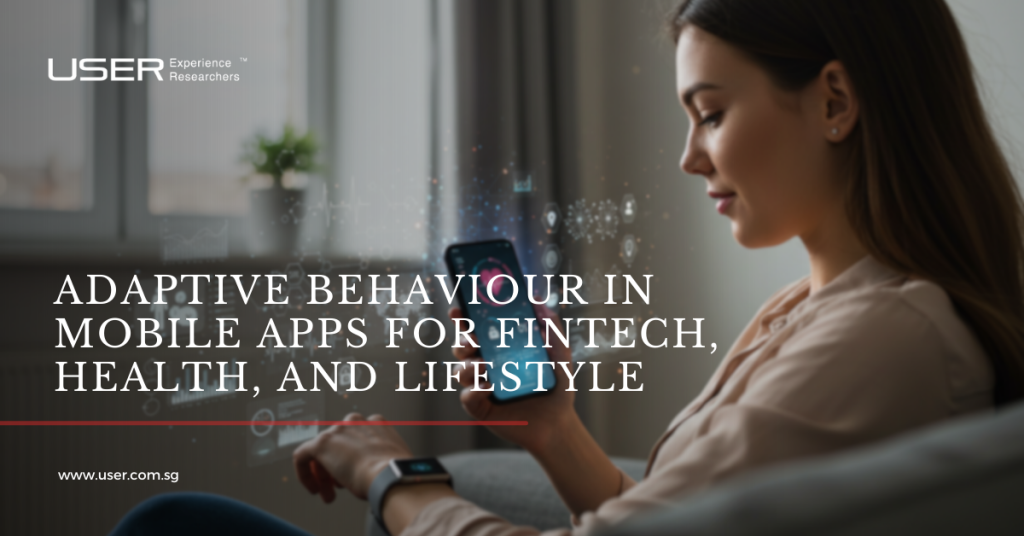Mobile Apps and Adaptive Behaviour
According to Deloitte, 65% of global business leaders report that AI technologies are already helping their organisations outperform competitors, with 81% expecting AI to become “critically important” to their success within two years. Artificial Intelligence (AI) is rapidly embedding itself into the fabric of everyday life, powering the apps we use to manage our health, track our spending, and optimise our routines.
With more and more uses in every aspect of human life, the digital world is evolving into a deeply intelligent ecosystem. As AI-integrated devices, especially smartphones and wearables, become more predictive and interconnected, we must ask: how far can this technology go in enhancing human potential? Could a future of seamless AI integration redefine how we live, work, and thrive? According to Sundar Pichai, CEO of Alphabet, “AI is one of the most important things humanity is working on. It is more profound than electricity or fire.” This perspective reflects the scale of its impact, including the transformation of mobile apps into adaptive, responsive tools that enhance user satisfaction and engagement.
AI-Powered Adaptive Behaviour: Redefining Mobile Experiences
Adaptive behaviour in mobile applications refers to an app’s ability to adjust features, content, and interactions in real time based on user activity, preferences, and contextual data. With AI, apps are not simply following pre-defined scripts, they are learning continuously through machine learning models, predictive analytics, and natural language processing.
By leveraging big data, neural networks, and behavioural algorithms, mobile apps predict what users need before they ask for it, creating a seamless and personalised experience that fosters engagement and loyalty. Let’s look at three key areas where AI is making waves in mobile app development: Fintech, Healthcare, and Lifestyle.
AI in Fintech Mobile Apps: Precision, Security, and Predictive Services
As financial institutions race to stay competitive in a rapidly digitising world, decision-makers are increasingly turning to AI to drive smarter, faster, and more secure operations. According to PwC, 52% of financial services firms are already making substantial investments in AI, with many citing improved risk management and customer experience as key outcomes. In enterprise settings, AI is increasingly becoming a strategic asset reshaping how financial services are delivered and optimised.
1. Intelligent Portfolio Management and Advisory
AI-powered platforms are enabling financial advisors and asset managers to deliver hyper-personalised investment strategies at scale. Robo-advisors, for instance, use machine learning to analyse client profiles, market trends, and behavioral data, helping institutions offer tailored financial products that adapt in real time to changing conditions.
2. Enterprise-Grade Fraud Detection
Advanced AI models are now central to fraud prevention strategies in banks and fintech firms. These systems continuously monitor vast volumes of transactions, identifying anomalies and flagging potential threats with increasing accuracy. For enterprise leaders, this means reduced financial losses and enhanced trust among clients.
3. Smarter Credit Risk Assessment
Traditional credit scoring is being redefined by AI. Financial institutions are using alternative data such as utility payments, e-commerce activity, and even mobile usage to assess creditworthiness more inclusively. This helps lenders make more informed decisions, reducing default rates and expanding financial access and open opportunities to new markets.
AI in Health Apps: Predictive Wellness and Smart Monitoring
In healthcare, decision-makers are increasingly recognising the transformative potential of artificial intelligence, and not just in clinical environments but also in the everyday tools people use to manage their wellbeing. From predictive
diagnostics to personalised treatment pathways, AI is becoming a cornerstone of digital health strategies.
1. Personalised Health Insights for Scalable Care
AI-enabled health applications are now capable of tracking vital signs, dietary habits, and activity levels to deliver bespoke wellness plans. For healthcare providers, this means scalable solutions that adapt to individual patient data, allowing for more proactive and preventative care. These apps can dynamically adjust exercise routines, recommend nutritional changes, and suggest early interventions based on evolving health patterns.
2. Predictive Analytics for Early Diagnosis
By leveraging continuous data from wearable devices, AI models can detect early indicators of chronic conditions such as diabetes, cardiovascular disease, and hypertension. This allows healthcare providers and clinicians to intervene earlier and improve their services for more patients, reducing the likelihood of severe complications and improving long-term outcomes.
3. Adaptive Mental Health Support at Scale
AI-powered platforms, including chatbots and cognitive behavioural therapy (CBT) tools, are being deployed to support mental health services. These systems analyse mood patterns, stress levels, and user interactions to deliver empathetic, personalised guidance. For mental health institutions, this offers a scalable way to extend support beyond traditional clinical settings, especially in underserved or remote areas.
AI in Lifestyle Apps: Hyper-Personalised Experiences
Context-aware experiences at scale is a developing trend in the lifestyle sector. The use of AI to deepen engagement, optimise content delivery, and drive behavioural change is making waves from global fitness brands to travel tech platforms and entertainment giants. According to a study, 73% of consumers expect technology to understand their individual needs, and enterprises are responding by embedding AI into the very core of their digital ecosystems.
1. Adaptive Content Curation for Dynamic Engagement
AI-powered lifestyle applications can now curate content feeds that evolve in real time. By analysing seasonality, location, user behaviour, and emerging trends, these platforms deliver highly relevant recommendations that keep users engaged and returning. For enterprises, this means higher retention rates and more meaningful user interactions.
2. Real-Time Goal Tracking and Behavioural Adjustment
Modern lifestyle platforms use AI to monitor users’ progress towards personal goals, automatically recalibrating milestones based on performance data. For instance, a corporate wellness app might adjust activity targets based on recovery needs or suggest alternative routines during travel. This level of adaptability allows businesses to offer more supportive and sustainable user journeys.
3. Context-Aware Notifications that Drive Action
By interpreting contextual signals such as weather, calendar events, and geolocation, AI ensures that notifications are timely, relevant, and actionable. This reduces notification fatigue and increases engagement, helping enterprises maintain a strong connection with users without overwhelming them.
Key AI Technologies Powering Adaptive Behaviour
Artificial intelligence fuels adaptive behaviour in applications by combining several powerful technologies: Machine Learning (ML), Natural Language Processing (NLP), Computer Vision, and Predictive Analytics. Here’s what they are and how they work:
Machine Learning (ML) enables apps to uncover patterns in vast datasets and generate anticipated outcomes with minimal human intervention. With adaptive ML, these models evolve continuously as user behaviours change, delivering ever more precise and personalised experiences.
Natural Language Processing (NLP) allows applications to interpret and respond to human language naturally. From powering chatbots and voice assistants to analysing sentiment and intent, NLP adapts interactions to context, tone, and user needs.
Computer Vision drives image-based interactions by recognising, interpreting, and improving visual inputs. It underpins use cases in various industries such as skin health monitoring in healthcare, receipt and expense scanning for commercial point of sales, and augmented reality shopping for e-commerce apps, with detection models that become more accurate over time.
Predictive Analytics works alongside these technologies by forecasting potential results or future behaviour based on historical and real-time data. This enables apps to anticipate user needs, adjusting features, offers, and interactions proactively to enhance engagement and satisfaction.
Together, these technologies create dynamic, responsive applications that feel more seamless, personalised, and human-centred with every interaction.
Future Trends in AI-Driven Adaptive Mobile Apps
Together, these technologies create dynamic, responsive applications that feel more seamless, personalised, and human-centred with every interaction.
1. Federated Learning for Privacy-First Adaptation
This technique allows AI models to learn from decentralised user data without transferring it to a central server, enhancing privacy while maintaining adaptability.
2. Emotionally Intelligent AI
Advances in affective computing will enable apps to detect emotions from text, voice, or facial expressions, adjusting interactions to be more empathetic.
3. Cross-App Adaptive Ecosystems
AI will soon enable interconnected app environments, where fintech, health, and lifestyle platforms share adaptive insights to offer a unified, personalised experience across domains.
4. Voice-First Adaptive Interfaces
As voice recognition improves, adaptive AI will optimise user journeys through natural conversations, reducing reliance on traditional UI navigation.
Conclusion
AI is reshaping the core of adaptive mobile app behaviour, making fintech platforms more predictive and secure, health apps more proactive and personalised, and lifestyle apps more context-aware and engaging. By applying the power of machine learning, predictive
analytics, and real-time adaptation, businesses build apps that anticipate user needs, adapt instantly, and foster lasting engagement.
The mobile applications that will lead in the future are those that treat adaptation as a continuous process, fuelled by AI insights and ethical innovation.
About USER Experience Researchers Pte. Ltd.
USER is a leading UX-focused company specialising in digital transformation consultancy, agile development, and workforce solutions. We have a steadfast commitment to innovating the best of today’s technology to promote sustainable growth for businesses and industries.
For more information, contact USER through project@user.com.sg
Article by Robelyn Padilla





